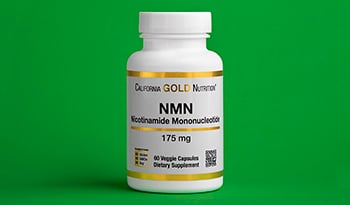Insulin Resistance: Causes, Signs, and 7 Helpful Supplements

What is Insulin Resistance?
Insulin resistance (IR) is very common yet rarely diagnosed, affecting hundreds of millions of people around the world. While there may be genetic predispositions to this condition, like a family history of type 2 diabetes, it is primarily caused by a sedentary lifestyle combined with a high-sugar diet. There are symptoms commonly associated with insulin resistance, and in some cases, these symptoms contribute to the actual cause.
Signs of Insulin Resistance
- High blood pressure (hypertension)
- Overweight
- Obesity
- Skin tags (especially the neck or groin)
- High cholesterol
- High triglycerides
- Fatty liver
- Prediabetes
- Diabetes
- Enlarged prostate
- Heart disease
- Polycystic ovarian syndrome (abnormal periods)
Causes of Insulin Resistance
Sometimes cells in the liver, fat, and muscles are resistant to the insulin hormone secreted by the pancreas. When this occurs, the body can’t regulate the amount of sugar allowed into the bloodstream to create energy and how much to store for future needs. The pancreas then begins to produce more insulin, and blood sugar continues to rise.
Lifestyle Factors for Managing Insulin Resistance
Lifestyle changes that can help prevent, reverse, and manage insulin resistance include:
- Weight loss: achieving your optimal weight can help improve hormone balance
- Daily exercise: at least 30 minutes of moderate exertion, five days per week
- Nutrient-rich diet: generous in vegetables and fruit servings
- Optimized gut health: diet and probiotics can help
- Special diets: many consider a paleo, keto, or Mediterranean diet to help reach optimize weight
Medications for Insulin Resistance
Metformin is frequently used for prediabetes and diabetes. This medication helps make insulin produced in the body more efficient. Since most women with polycystic ovarian syndrome have insulin resistance, this medication may help restore a woman’s menstrual cycle back to normal.
7 Supplements for Managing Insulin Resistance
Berberine
Berberine is extracted from the barberry (berberis vulgaris) shrub, which contains plants that are both evergreen and deciduous. Found throughout Europe, North Africa, the Middle East, and Asia, barberry produces berries rich in vitamin C, which provides a whole host of health benefits.
Berberine, the active ingredient of the shrub, is consumed as an herbal food and supplement. It has been shown in scientific studies to have various health benefits. It is commonly used in Traditional Chinese Medicine (TCM) and ayurvedic medicine.
Berberine may reduce insulin resistance and lower blood sugar. In addition, it has antioxidant properties, which can help reduce inflammation and may be beneficial in the prevention and treatment of those with cardiovascular disease. A 2017 study suggested that berberine may exert part of its effects by positively influencing the gut microbiome.
A 2015 study in the Journal of Ethnopharmacology showed that berberine could be helpful in lowering blood sugar and total cholesterol levels. In addition, it seemed to help elevate HDL (good) cholesterol, which is associated with protection against heart attacks.
A 2012 study showed that berberine could be helpful in improving insulin sensitivity, which ultimately helps to lower both blood insulin and glucose levels.
A 2010 study in Biochemical Pharmacology showed berberine activated GLP-1, which promotes insulin secretion and ultimately helps control blood glucose.
Scientists have shown that berberine can also have beneficial effects on the gut microbiome by promoting the growth of healthy gut bacteria.
Chromium
Chromium is an important element required for numerous enzyme reactions, including an enzyme called the glucose tolerance factor, or GTF. This enzyme helps optimize insulin function and glucose control.
A 2017 meta-analysis study in the Journal of Trace Elements in Medicine and Biology concluded the supplementation with chromium picolinate had beneficial effects in reducing body mass index (BMI), fasting insulin levels, and total testosterone levels in women with PCOS.
Likewise, a 2015 double-blind, placebo-controlled trial in the Annals of Nutrition and Metabolism showed that chromium supplementation lowered insulin levels in women with polycystic ovary syndrome. Those who took the chromium also saw improvements in their cholesterol profile. A 2016 study also showed that chromium picolinate could reduce insulin resistance in female patients while also helping control their menstrual cycles.
A 2018 study demonstrated that chromium could lower insulin resistance in women with diabetes and polycystic ovarian syndrome. This important trace mineral should be considered by anyone trying to improve their metabolic profile.
N-Acetyl Cysteine (Nac)
NAC is an important nutrient that helps the body to eliminate toxins, especially those in the liver. Doctors give it to patients hospitalized in response to acetaminophen/paracetamol (Tylenol) overdose. However, taken as a supplement orally, it can help remove everyday environmental toxins as well.
A 2015 meta-analysis study published in Obstetrics and Gynecology International showed that women with insulin resistance and PCOS who were given NAC were more likely to ovulate, become pregnant, and deliver a baby compared to women who were given a placebo pill. There were no negative effects seen in the women who took the NAC.
A separate 2015 study of women with PCOS compared NAC taken at a dose of 600 mg three times per day and the prescription drug metformin at a dose of 500 mg three times per day. The researchers concluded that NAC could lower fasting blood sugar and cholesterol better than the pharmaceutical drug metformin.
Lastly, a 2020 study using an animal model also showed that NAC supplementation could help reduce insulin resistance.
L-Carnitine
L-carnitine is an important amino acid found in high concentration in both the muscles and brain. Along with playing an important role in the production of energy and metabolism, it could also have a positive effect on insulin regulation.
A 2015 randomized, double-blind, placebo-controlled study of 60 women with PCOS and insulin resistance was conducted. All were considered overweight. Half of the women were given 250 mg of L-carnitine, the other 30 women were given a placebo pill. Both groups were followed for 12 weeks, and at the end of the period, those who took the L-carnitine saw a reduction in weight and waist circumference and had lower blood sugar, meaning their insulin resistance improved.
A 2014 study in the European Journal of Obstetrics and Gynecology and Reproductive Biology demonstrated that women with PCOS who were resistant to clomiphene (a prescription drug that can help a woman become pregnant), were more likely to become pregnant when 3,000 mg of L-carnitine was added to their daily drug regimen. This is an excellent example of using both nutritional supplements and prescription drugs to achieve the desired health goal of reducing insulin resistance. While this study was specifically conducted in women, men with insulin resistance are also likely to benefit.
A 2017 study had similar findings, concluding that L-carnitine could help reduce insulin resistance in test subjects when supplemented. A 2019 study also found similar benefits.
Co-Enzyme Q10
CoQ10 is a popular supplement that plays an important role in energy metabolism. It is commonly taken by those on prescription cholesterol-lowering medications but studies show it may also be helpful in those with insulin resistance, prediabetes, and diabetes.
A 2017 double-blind, placebo-controlled study in Clinical Endocrinology evaluated the use of 100 mg of co-enzyme Q10 versus placebo in women with insulin resistance. The subjects underwent blood tests, took the supplement or placebo for 12 weeks, and then underwent repeat blood testing. The results showed that those who took the co-enzyme Q10 had a reduction in blood sugar and insulin levels, which are both normally high in those with insulin resistance and PCOS.
A 2018 double-blind, placebo-controlled study out of Korea also found benefits. In the study, 80 patients with prediabetes were separated into two groups. Half took a placebo while half were given coenzyme Q10. Those who were given the supplement saw a reduction in their insulin resistance, leading the researchers to conclude that coenzyme Q10 may slow the progression to diabetes.
Omega-3 Fatty Acids
Omega-3 essential fatty acids consist primarily of eicosapentaenoic acid (EPA) and docosahexaenoic acid (DHA). These important nutrients can be found in a variety of food sources, which include fish (mackerel, cod, and salmon are among the richest), walnuts, chia seeds, flax seeds, hemp seeds, avocado, and natto.
A 2009 study showed that women with PCOS and insulin resistance who had a fatty liver could reduce the amount when omega-3 fatty acids were consumed. The researchers also noted an improvement in blood pressure and triglycerides.
A 2011 study also showed that increased intake of omega-3 fatty acids could help reduce bioavailable testosterone in women with PCOS and insulin resistance. A 2018 study also showed that flaxseed could help reduce insulin levels in women with PCOS in addition to reducing insulin resistance.
Selenium
Selenium is a trace mineral, meaning that it is required in small amounts by humans. It must be consumed through diet or by taking vitamins and minerals. It is a powerful antioxidant that is not only important for brain health but also thyroid health, helping to support an optimized immune system. Dietary-wise, Brazil nuts are one of the best sources of selenium available.
According to a 2013 study of women in Turkey, those with PCOS and insulin resistance had lower selenium levels in their blood when compared to women without the condition. It is believed that this mineral deficiency plays a role in the cause of PCOS and the regulation of hormone and insulin levels.
A 2014 randomized, double-blind, placebo-controlled study showed selenium could be helpful in women with PCOS. Specifically, selenium could lower insulin levels and help improve cholesterol profiles, such as lowering triglycerides and LDL (bad) cholesterol.
A 2018 randomized, double-blind, placebo-controlled study evaluated selenium supplementation in those with congestive heart failure and insulin resistance. The researchers concluded that 12 weeks of selenium supplementation had beneficial effects on insulin metabolism.
Taking more than the 200 mcg daily dose is not recommended, according to studies
References:
- Brown AE, Walker M. Genetics of Insulin Resistance and the Metabolic Syndrome. Curr Cardiol Rep. 2016 Aug;18(8):75.
- Drug Metab Rev. 2017 May;49(2):139-157.
- Li C, He JZ, Zhou XD, Xu X. [Berberine regulates type 2 diabetes mellitus related with insulin resistance]. Zhongguo Zhong Yao Za Zhi. 2017 Jun;42(12):2254-2260. Chinese.
- J Ethnopharmacol. 2015 Feb 23;161:69-81.
- Berberine improves insulin sensitivity by inhibiting fat store and adjusting adipokines profile in human preadipocytes and metabolic syndrome patients. Yang J, Yin J, Gao H, Xu L, Wang Y, Xu L, Li M Evid Based Complement Alternat Med. 2012; 2012():363845
- Modulation of glucagon-like peptide-1 release by berberine: in vivo and in vitro studies. Yu Y, Liu L, Wang X, Liu X, Liu X, Xie L, Wang G Biochem Pharmacol. 2010 Apr 1; 79(7):1000-6.
- Modulating gut microbiota as an anti-diabetic mechanism of berberine. Han J, Lin H, Huang W Med Sci Monit. 2011 Jul; 17(7):RA164-7.
- Siavash Fazelian, Mohamad H. Rouhani, Sahar Saraf Bank, Reza Amani, Chromium supplementation and polycystic ovary syndrome: A systematic review and meta-analysis, Journal of Trace Elements in Medicine and Biology, Volume 42, 2017, Pages 92-96, ISSN 0946-672X, https://doi.org/10.1016/j.jtemb.2017.04.008.
- Jamilian M, Asemi Z, Chromium Supplementation and the Effects on Metabolic Status in Women with Polycystic Ovary Syndrome: A Randomized, Double-Blind, Placebo-Controlled Trial. Ann Nutr Metab 2015;67:42-48
- Ashoush S, Abou-Gamrah A, Bayoumy H, Othman N. Chromium picolinate reduces insulin resistance in polycystic ovary syndrome: Randomized controlled trial. J Obstet Gynaecol Res. 2016 Mar;42(3):279-85.
- Heshmati J, Omani-Samani R, Vesali S, Maroufizadeh S, Rezaeinejad M, Razavi M, Sepidarkish M. The Effects of Supplementation with Chromium on Insulin Resistance Indices in Women with Polycystic Ovarian Syndrome: A Systematic Review and Meta-Analysis of Randomized Clinical Trials. Horm Metab Res. 2018 Mar;50(3):193-200. f
- Divyesh Thakker, Amit Raval, Isha Patel, and Rama Walia, “N-Acetylcysteine for Polycystic Ovary Syndrome: A Systematic Review and Meta-Analysis of Randomized Controlled Clinical Trials,” Obstetrics and Gynecology International, vol. 2015, Article ID 817849, 13 pages, 2015. https://doi.org/10.1155/2015/817849.
- Forough Javanmanesh, Maryam Kashanian, Maryam Rahimi & Narges Sheikhansari (2016) A comparison between the effects of metformin and N-acetyl cysteine (NAC) on some metabolic and endocrine characteristics of women with polycystic ovary syndrome, Gynecological Endocrinology, 32:4, 285-289,
- Zalewska A, Zięba S, Kostecka-Sochoń P, Kossakowska A, Żendzian-Piotrowska M, Matczuk J, Maciejczyk M. NAC Supplementation of Hyperglycemic Rats Prevents the Development of Insulin Resistance and Improves Antioxidant Status but Only Alleviates General and Salivary Gland Oxidative Stress. Oxid Med Cell Longev. 2020 Nov 14;2020:8831855.
- Samimi, M. , Jamilian, M. , Ebrahimi, F. A., Rahimi, M. , Tajbakhsh, B. and Asemi, Z. (2016), Oral carnitine supplementation reduces body weight and insulin resistance in women with polycystic ovary syndrome: a randomized, double‐blind, placebo‐controlled trial. Clin Endocrinol, 84: 851-857.
- Alaa M. Ismail, Ali Hassan Hamed, Srdjan Saso, Hossam H. Thabet, Adding l-carnitine to clomiphene resistant PCOS women improves the quality of ovulation and the pregnancy rate. A randomized clinical trial, European Journal of Obstetrics & Gynecology and Reproductive Biology, Volume 180, 2014, Pages 148-152,
- Xu Y, Jiang W, Chen G, Zhu W, Ding W, Ge Z, Tan Y, Ma T, Cui G. L-carnitine treatment of insulin resistance: A systematic review and meta-analysis. Adv Clin Exp Med. 2017 Mar-Apr;26(2):333-338.
- Fathizadeh H, Milajerdi A, Reiner Ž, Kolahdooz F, Asemi Z. The effects of L-carnitine supplementation on glycemic control: a systematic review and meta-analysis of randomized controlled trials. EXCLI J. 2019 Aug 19;18:631-643.
- Samimi, M. , Zarezade Mehrizi, M. , Foroozanfard, F. (2017), The effects of coenzyme Q10 supplementation on glucose metabolism and lipid profiles in women with polycystic ovary syndrome: a randomized, double‐blind, placebo‐controlled trial. Clin Endocrinol, 86: 560-566.
- Yoo JY, Yum KS. Effect of Coenzyme Q 10 on Insulin Resistance in Korean Patients with Prediabetes: A Pilot Single-Center, Randomized, Double-Blind, Placebo-Controlled Study. Biomed Res Int. 2018 Jul 29;2018:1613247.
- The Journal of Clinical Endocrinology & Metabolism, Volume 94, Issue 10, 1 October 2009, Pages 3842–3848,
- Niamh Phelan, Annalouise O’Connor. Hormonal and metabolic effects of polyunsaturated fatty acids in young women with polycystic ovary syndrome: results from a cross-sectional analysis and a randomized, placebo-controlled, crossover trial – , The American Journal of Clinical Nutrition, Volume 93, Issue 3, 1 March 2011, Pages 652 662
- Exp Clin Endocrinol Diabetes 2018; 126(04): 222-228
- Jamilian, M. , Razavi, M. , Fakhrie Kashan, Z. , Ghandi, Y. , Bagherian, T. and Asemi, Z. (2015), Metabolic response to selenium supplementation in women with polycystic ovary syndrome: a randomized, double‐blind, placebo‐controlled trial. Clin Endocrinol, 82: 885-891.
- Raygan F, Behnejad M, Ostadmohammadi V, Bahmani F, Mansournia MA, Karamali F, Asemi Z. Selenium supplementation lowers insulin resistance and markers of cardio-metabolic risk in patients with congestive heart failure: a randomised, double-blind, placebo-controlled trial. Br J Nutr. 2018 Jul;120(1):33-40.
- Behar A, Dennouni-Medjati N, Harek Y, Dali-Sahi M, Belhadj M, Meziane FZ. Selenium overexposure induces insulin resistance: In silico study. Diabetes Metab Syndr. 2020 Nov-Dec;14(6):1651-1657.
DISCLAIMER:This Wellness Hub does not intend to provide diagnosis...
















































































 Table of Contents
Table of Contents















